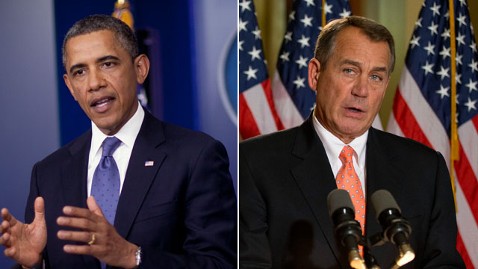President Obama, now facing the consequences of automatic spending cuts and the complications they raise for his broader domestic agenda, is taking the most specific steps of his administration in an attempt to ensure the election of a Democratic-controlled Congress in two years.
“What I can’t do is force Congress to do the right thing,” Obama told reporters at the White House on Friday after a fruitless meeting with Republican leaders to avert the country’s latest fiscal crisis, known as the sequester. “The American people may have the capacity to do that.”
Obama, fresh off his November reelection, began almost at once executing plans to win back the House in 2014, which he and his advisers believe will be crucial to the outcome of his second term and to his legacy as president. He is doing so by trying to articulate for the American electorate his own feelings — an exasperation with an opposition party that blocks even the most politically popular elements of his agenda.
Obama has committed to raising money for fellow Democrats, agreed to help recruit viable candidates, and launched a political nonprofit group dedicated to furthering his agenda and that of his congressional allies. The goal is to flip the Republican-held House back to Democratic control, allowing Obama to push forward with a progressive agenda on gun control, immigration, climate change and the economy during his final two years in office, according to congressional Democrats, strategists and others familiar with Obama’s thinking.
“The president understands that to get anything done, he needs a Democratic majority in the House of Representatives,” said Rep. Steve Israel (D-N.Y.), chairman of the Democratic Congressional Campaign Committee. “To have a legacy in 2016, he will need a House majority in 2014, and that work has to start now.”
An evolution in strategy
This approach marks a significant shift in the way Obama has worked with a divided Congress. He has compromised and badgered, but rarely — and never so early — campaigned to change its composition.
Democrats would have to gain 17 House seats to win back the majority they lost in 2010, and their challenge involves developing a persuasive argument for why the party deserves another chance controlling both Congress and the presidency. In the last election, American voters reaffirmed the political status quo in Washington, choosing to retain a divided government.
Of all the presidents since Franklin D. Roosevelt, only Bill Clinton picked up House seats for his party in the midterm election of his second term
. His approval rating on the eve of the 1998 contest was 65 percent, 14 points above Obama’s current public standing.
The specific steps Obama is taking to win back the House for his party mark an evolution for a president long consumed by the independence of his political brand.
Obama has committed to eight fundraisers for the Democratic Congressional Campaign Committee this year, compared with just two events in 2009. The Democrats lost the House the following year, and Obama’s legislative agenda has largely stalled since then.










